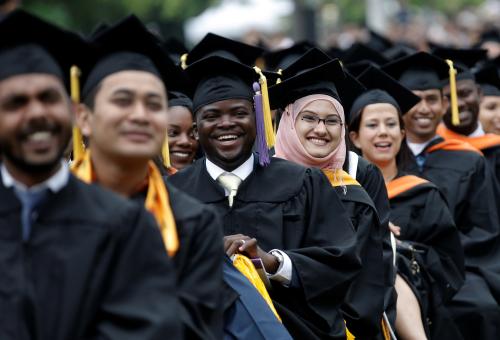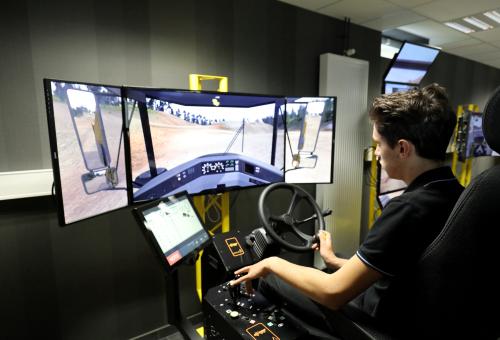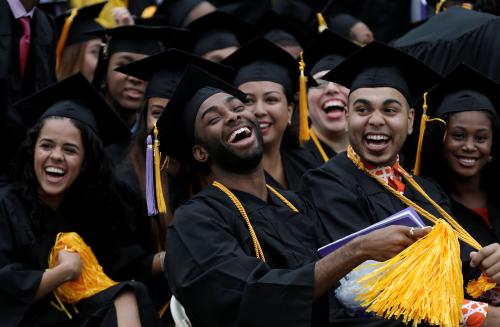This story was produced by The Hechinger Report, a nonprofit, independent news organization focused on inequality and innovation in education.
Marissa Marshall, a junior at Georgetown University in Washington, D.C., is quiet and soft-spoken on campus, but she works tirelessly just a few miles from campus at The Brookings Institution. As a paid research intern, she conducts literature reviews and analyzes census data for me. Her work shouts of the kind of enthusiasm she should have when learning about a potential career. I value her contributions to the research team daily.
But in previous semesters, Marshall earned money doing something completely different—working as a student guard at the university, as part of a commonplace federally backed work-study job. Although she is not a trained security officer at Georgetown, Marshall is more than capable of checking whether her peers swipe their student access cards and making sure only authorized people enter campus facilities. In fact, she was so good at watching people swipe their identification cards that she earned a promotion, managing other student guards who monitor card swiping. And if that sounds glib, it’s because I’m deliberately throwing shade.
Marshall appreciates the money she earned, she says, and the opportunity to serve the university as a security guard, but her work at Brookings has made her realize what a difference relevant professional and educational work experience can make, for all students. She doesn’t want to become a security specialist. And I’m pretty sure Georgetown hopes she gets a job in the public policy realm after graduation, as she has been exposed to here at Brookings. We shouldn’t dismiss work during an era of automation and displacement, and Marshall’s security job does add value to the university, but she is clearly better off pursuing a career that better aligns with her studies and professional interests, earning while she learns.
Colleges and nearby employers should work closely to provide students more opportunities to gain the work-relevant skills that they want and society needs them to have. When I was in college, the ideal work-study job was one that gave you enough flexibility to complete course work while on the job, such as a gig at a front desk, signing people into a chapel that few people entered. Any job that paid you while you studied was the most desirable, even in the eyes of university faculty and staff. Working at a job that required you to pay attention to earn your paycheck was seen simply as a distraction from schoolwork, which took priority.
Research generally supports this belief. Students who work on campus for less than 15 hours a week, which is the limit for federally backed work-study, have higher graduation rates than those who work off-campus for more hours. Therefore, faculty and staff recommend on-campus jobs for a limited amount of hours.
“Unfortunately, this simple recommendation is no longer feasible or realistic for the typical undergraduate,” writes University of Pennsylvania education researcher Laura Perna in a 2010 blog post for the American Association of University Professors website. “Most college students are now not only employed but also working a substantial number of hours, a fact not widely understood or discussed by faculty members and policy makers.”
But students can and should get more from college jobs than a paycheck; they also deserve a professional experience that will allow them to apply their classroom learning, give them some polish, and make them more desirable to recruiters post-graduation. This is illustrated in a new report, Employing Student Success, recently published by Student Affairs Administrators in Higher Education, a membership organization focused on campus life and student affairs that goes by the acronym NASPA. According to the report, which was based on a study of the kinds of work-study jobs students currently have on campuses nationwide, well-designed employment programs can help students get “meaningful learning and engagement opportunities that can help with retention and build career-readiness skills.”
Students can and should get more from college jobs than a paycheck; they also deserve a professional experience that will allow them to apply their classroom learning, give them some polish, and make them more desirable to recruiters post-graduation.
One of five main goals of the study was to find the “degree to which student employment is being implemented and leveraged at the institution level as a student success strategy.” In other words, how are campuses using employment as a means to prepare students for graduation and beyond? This goal seems to have the most bearing on whether or not the campus has students’ financial, academic and professional interests in mind.
The researchers found that first and foremost, the creation of employment opportunities on campus that consider students’ financial, academic and professional needs is strongly influenced by the level of engagement of senior leadership, noting that “Institutions with senior-level or cabinet member involvement seem better positioned to elevate their student employment program as a multifaceted student success strategy.” Colleges and universities must also communicate the importance of working on campus and inform students of the opportunities that are available. Having a central repository of all available jobs, such as an online jobs board, can help.
The study found that work-study supervisors, those directly responsible for professional development of the students, are the linchpins of the student experience. Consequently, colleges should develop tools that help supervisors evaluate and monitor students’ progress and make clear to all parties what students are supposed to get out of the experience. And finally, postsecondary institutions must use data to measure the impact of employment on the student. As stated in the report, “While data metrics related to compliance are important, more institutions should also assess data to understand student employee success, which can include metrics such as retention rates, completion rates, grade point averages, levels of engagement, and overall satisfaction rates.”
Colleges should develop tools that help supervisors evaluate and monitor students’ progress and make clear to all parties what students are supposed to get out of the experience.
In a related 2016 study, Columbia Teachers College researchers Judith Scott-Clayton and Veronica Minaya found that federal work-study jobs increased the likelihood of graduation, confirming the findings of prior research. (The Hechinger Report is based at Columbia Teachers College). However, they also found that low-income students are less likely to receive these positions. So colleges must create professional opportunities that prioritize low-income students as part of a strategy to boost overall college success. For instance, academic advisors can present professional opportunities in academic advisement sessions.
While the NASPA study looked at how to align on-campus jobs to goals that went beyond financial need, I believe there must be much more alignment of these goals to off-campus work and to employers in the nearby area.
Marshall attends classes just a few miles away from her work with me at the Brookings Institution. She told me, “I always wanted to learn how a think tank works.” Internships should be as rich as the one Marshall is receiving, and available to all students. It’s important that we give all students a financial and professional opportunity to contribute to organizations while they work toward a degree.
Sure, we need security guards. But a leading university like Georgetown isn’t really preparing its graduates for that line of work. So why not help students get jobs that will prepare them for their prospective careers?
The Brookings Institution is committed to quality, independence, and impact.
We are supported by a diverse array of funders. In line with our values and policies, each Brookings publication represents the sole views of its author(s).







Commentary
College students should get more from work study jobs
March 29, 2019